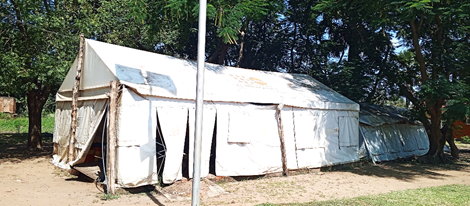DRDIP’s Dormitory at Maaji Seed SS Increases Enrolment and Performance
In 2021, the residents of Maaji II Refugee Settlement welcomed Maaji Secondary School in 2021 under the Uganda Secondary Education Expansion Project with reservation. While they knew it would improve access to education, the project had only achieved that basic right; a lot still needed to be done to improve learning outcomes, especially for the girl child.
Today, the construction
of a dormitory with beds, sanitary facilities, planting of trees and provision
of solar under the Development Response to Displacement Impact (DRDIP) in 2022 has
improved the quality of education service provided. This has led to an increase
in enrollment of girls from 200 to 320 with 240 in the boarding section, a reduced
number of school dropouts, reduced absenteeism, reduced teenage pregnancies,
and improved performance in UCE mock exams.
According to Evuma, Norbert,
the Head Teacher, reveals that there was no girl among the students who
attained Division I in the mock results for 2022 while this year in 2023, there
was one girl in Division I in the just concluded mock exams against 4 boys. In
the overall performance in UCE, they managed to be in the 4th
position out of 22 schools in the district with only two first grades. With
this improvement, they are optimistic that the school will excel in the 2023
UCE national exams with more than 4 first grades.
Norbert, observes that
this is mainly because students have more time to read while in the boarding
section and effortlessly attend extra lessons conducted during the night
(evening preps) and on weekends.
“In
the last Parents and Teachers Association meeting, we agreed to install electricity
in all the classes. During the night, they use the lights for conducting extra
lessons known as preps.” Norbert observes.
Norbert also adds that
the intervention of DRDIP has reduced teenage pregnancies and helped girls
concentrate at school.
“Most
of our students come from far. Some of them even cross the River Nile and some
streams. On their way to school every day, they would come across many
challenges including being lured into early marriage.”
Norbert adds.
Duluga Patrick, 35, one
of the parents at the school also observes that keeping the students at the
school premises provides an opportunity for more interaction between the
students and teachers because lessons used to end at 4:30 pm and only resume
the next day.
“The
hours of contact between the teachers and their learners have increased because
previously classes used to stop at 4:30 pm. But now lessons have been extended
to 5 pm.” Patrick explains.
Patrick also says
students have more time to revise while in the boarding section as opposed to
being a day scholar. This he notes has also reduced absenteeism because most of
the students stay within the school premises.
Usually,
when our children return home, we assign them a lot of work. At the end of their
chores, many children are too tired to open a book and read and this continues
for most of the week.” Patrick observes.
Aisha Jaguru, one of
the girls at the school who excelled in the mock exams, says that staying in
the dormitory allows her and her peers to read and revise adequately for exams because
of the availability of both the solar system and a generator, something that is
unlikely to happen at home because of the unstable and lack of power
supply/electricity in Adjumani and the larger West Nile.
She is saddened by the
prevailing situation that impedes 80 other girls from attending the boarding
section. Although, this is partly because some parents can’t afford it; the
major reason for them staying away is inadequate beds. According to the Head
Teacher, students have to share the available 120-decker beds but due to the
overwhelming number, some who sleep on the floor.
“When
the deckers are combined, five people have to sleep together, Some people are
uncomfortable with this arrangement, and so they sleep on the floor. This
however means that you have to wake up earlier than others.”
Aisha reveals.
Akuku Phillip Kaya, the
Principal Education Officer, acknowledges that the district has many unfunded
priorities which has been worsened by the refugees’ burden due to limited
resources. He adds that the education department has always called upon partners
to support but notes the unique contribution of DRDIP which uses a community-led
approach to recommend and initiate projects in refugee-hosting areas.
Maaji Seed Secondary School
has 663 refugees out of a total enrollment of 1,124 students. Maaji Refugee
Settlement divided into I, II and III is home to about 40,000 refugees.
By
Doreen Bazio, Communications Officer, Adjumani District



Comments
Post a Comment